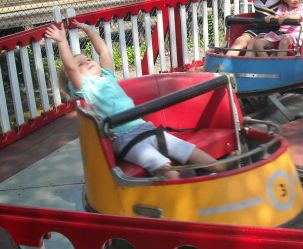Post by misty on Jan 6, 2007 22:55:49 GMT -5
hread Started on Mar 11, 2006, 6:14pm
Kim Komando has an interesting article about My space.com & the dangers of children posting on the web without being properly informed. I just thought I'd pass it on:'
MySpace has exploded, claiming millions of members. It's easy to use, and it has mass. Anyone can join. But it's particularly popular with those in their early teens to late 20s. Because of its size, problems with pedophiles and lack of controls, it has developed a negative reputation.
So, let's look at MySpace. Anyone 14 and over can get a free account. All it takes is a valid e-mail address. However, there is no verification of a person's age. Once you sign up, you can customize your profile page.
Profile pages typically contain personal information. Songs, pictures, comments and friends' comments often are included.
Most importantly, there is a section to list friends who are also on MySpace. You can point MySpace to your AOL, Gmail, Hotmail or Yahoo! address book to see if anyone you know has registered with the site. MySpace will list any members in your address book.
From that list you can send a friend request. The member receiving the friend request must approve it in order to be linked as friends. But you can also find new friends by searching MySpace's database for people with similar interests.
The member search function offers a quick way to locate registered users based on information they list in their profile. You can search by gender, age, marital status, location, ethnicity, body type, height, education, orientation, religion, income and even preference to having children. Obviously, this has great potential for someone seeking 15-year-old children.
A random search is an eye-opener for most parents. Underage members post pictures of themselves with friends drinking beer. Others write about their experiences with drugs. Frank and sexually explicit comments appear on friends' profile pages.
If you have teenagers, they may well have MySpace pages. Ask to see them. Objectionable pictures or comments can be removed. If your child is under 14, have the profile removed. Click the contact link at the bottom of the MySpace page. Complete the form and include your child's URL.
Your children must understand that anyone can see the information they post. Many youngsters have no concept that millions of people can see what they post. They also may not understand that anyone can pretend to be someone else. According to the Center for Missing and Exploited Children, each week an average of 50 children fall prey to online predators. This statistic is not limited to MySpace users, but covers the Web as a whole.
Young adults also make mistakes on these sites. I know of a case in which an employer checked job applicants on a Web site. He hired a person at a lower salary than he expected to pay. Why? She was the picture of confidence in her interview. But, on her page, she said she desperately needed the job.
Although MySpace and other sites like it can be a fun experience, remind your children that what gets posted on the Internet can have far-reaching consequences. The Web is a great communications device. But the dangers are undeniable. Parents must tackle this before something terrible happens.
www.komando.com/kolumns_show.asp?showID=9586#complete
And from CBS news:
talking to some teens who regularly use MySpace, it's easy to see that a lot of kids aren't very careful about the information they put on their pages.
"So many people don't even use common sense," says Katie Pirtle, a high school student. "Some people even put their phone number on there."
And while they information kids put on MySpace may be intended for their friends, do they think, "Hey there's 35-year-old or 45-year-old guys out there looking at my site?"
"Definitely not," says April Ehrlich, another high school student. "When they think MySpace, they think other teenagers. They don't think there are adults pretending to be teenagers on there."
Many MySpace users post "the survey," which asks for responses about issues like drinking, drug use and skinny dipping. Users can also put up pictures.
MySpace declined CBS News' request for an on-camera interview but said in a statement: "We dedicate a third of our workforce to policing and monitoring our site."
The site requires users be 14 or older, and they are warned not to post any "personally identifiable material." But the teens we spoke to say that advice is routinely ignored.
"Just like a car accident, it can happen to you," says high school student Julia Rinaldi. "Predators can come to you — and that's what they don't think when they post those things."
Those predators include men like 26-year-old Jeffrey Neil Peters, who was arrested last month for sexually assaulting Susie Granger's daughter. Granger says parents should keep their kids off the site.
"Please don't allow your children to go onto MySpace," she says. "It's a very unsafe environment for them to be in."
But for the thousands of teens who are hooked on the site, it's a warning that's lost in cyberspace.
Blogging Safety Tips
From BlogSafety.com (a site operated by CBS technology consultant Larry Magid)
# Avoid postings that could enable a stranger to find you. That includes your last name, the name of your school or sports teams, the town you live in and where you hang out.
# Check to see if your blogging service has a "friends" list that allows you to control who can visit your blog. If so, be sure to allow only people you know and trust. Be very careful before adding strangers to your list and be extremely careful about the information you post that can be accessed by people outside your friends list.
# Avoid getting together with someone you "meet" through a blog unless you are certain of their actual identity. If you do meet them, arrange the meeting in a public place and bring some friends along.
# Be very careful about photographs you put on your blog. It's best to avoid photos that can make it easy for people to recognize you. It's a very bad idea to post photos that are suggestive or sexual in nature. Before uploading a photo, ask how you would feel if that picture were seen by your parents, a college admissions counselor, a potential employer, a future boyfriend/girlfriend or spouse or, perhaps, your grandparents. What if you were to run for office someday? What you post on the Internet can be downloaded by others and can hang around forever.
# Avoid postings that could embarrass you, your friends or family members now or later. Remember, what you post on your blog can be copied and stored and could come back to haunt you years later.
# If you allow non-friends or strangers to post comments to your blog, check the comments regularly to make sure they're appropriate and, if not, remove them. Never allow messages that are mean, threatening or embarrassing to you or others. Never respond to such messages either. Just delete them and, if possible, block that person from visiting your blog.
# Do not lie about your age when you sign up for a blog. Age limitations are there for a good reason. Claiming that you are older than you are could get you into trouble and put you at risk.
For more information about blogging and Internet safety, please visit my sites, BlogSafety.com, SafeTeens.com and SafeKids.com.
www.cbsnews.com/stories/2006/02/06/eveningnews/main1286130.shtml
Kim Komando has an interesting article about My space.com & the dangers of children posting on the web without being properly informed. I just thought I'd pass it on:'
MySpace has exploded, claiming millions of members. It's easy to use, and it has mass. Anyone can join. But it's particularly popular with those in their early teens to late 20s. Because of its size, problems with pedophiles and lack of controls, it has developed a negative reputation.
So, let's look at MySpace. Anyone 14 and over can get a free account. All it takes is a valid e-mail address. However, there is no verification of a person's age. Once you sign up, you can customize your profile page.
Profile pages typically contain personal information. Songs, pictures, comments and friends' comments often are included.
Most importantly, there is a section to list friends who are also on MySpace. You can point MySpace to your AOL, Gmail, Hotmail or Yahoo! address book to see if anyone you know has registered with the site. MySpace will list any members in your address book.
From that list you can send a friend request. The member receiving the friend request must approve it in order to be linked as friends. But you can also find new friends by searching MySpace's database for people with similar interests.
The member search function offers a quick way to locate registered users based on information they list in their profile. You can search by gender, age, marital status, location, ethnicity, body type, height, education, orientation, religion, income and even preference to having children. Obviously, this has great potential for someone seeking 15-year-old children.
A random search is an eye-opener for most parents. Underage members post pictures of themselves with friends drinking beer. Others write about their experiences with drugs. Frank and sexually explicit comments appear on friends' profile pages.
If you have teenagers, they may well have MySpace pages. Ask to see them. Objectionable pictures or comments can be removed. If your child is under 14, have the profile removed. Click the contact link at the bottom of the MySpace page. Complete the form and include your child's URL.
Your children must understand that anyone can see the information they post. Many youngsters have no concept that millions of people can see what they post. They also may not understand that anyone can pretend to be someone else. According to the Center for Missing and Exploited Children, each week an average of 50 children fall prey to online predators. This statistic is not limited to MySpace users, but covers the Web as a whole.
Young adults also make mistakes on these sites. I know of a case in which an employer checked job applicants on a Web site. He hired a person at a lower salary than he expected to pay. Why? She was the picture of confidence in her interview. But, on her page, she said she desperately needed the job.
Although MySpace and other sites like it can be a fun experience, remind your children that what gets posted on the Internet can have far-reaching consequences. The Web is a great communications device. But the dangers are undeniable. Parents must tackle this before something terrible happens.
www.komando.com/kolumns_show.asp?showID=9586#complete
And from CBS news:
talking to some teens who regularly use MySpace, it's easy to see that a lot of kids aren't very careful about the information they put on their pages.
"So many people don't even use common sense," says Katie Pirtle, a high school student. "Some people even put their phone number on there."
And while they information kids put on MySpace may be intended for their friends, do they think, "Hey there's 35-year-old or 45-year-old guys out there looking at my site?"
"Definitely not," says April Ehrlich, another high school student. "When they think MySpace, they think other teenagers. They don't think there are adults pretending to be teenagers on there."
Many MySpace users post "the survey," which asks for responses about issues like drinking, drug use and skinny dipping. Users can also put up pictures.
MySpace declined CBS News' request for an on-camera interview but said in a statement: "We dedicate a third of our workforce to policing and monitoring our site."
The site requires users be 14 or older, and they are warned not to post any "personally identifiable material." But the teens we spoke to say that advice is routinely ignored.
"Just like a car accident, it can happen to you," says high school student Julia Rinaldi. "Predators can come to you — and that's what they don't think when they post those things."
Those predators include men like 26-year-old Jeffrey Neil Peters, who was arrested last month for sexually assaulting Susie Granger's daughter. Granger says parents should keep their kids off the site.
"Please don't allow your children to go onto MySpace," she says. "It's a very unsafe environment for them to be in."
But for the thousands of teens who are hooked on the site, it's a warning that's lost in cyberspace.
Blogging Safety Tips
From BlogSafety.com (a site operated by CBS technology consultant Larry Magid)
# Avoid postings that could enable a stranger to find you. That includes your last name, the name of your school or sports teams, the town you live in and where you hang out.
# Check to see if your blogging service has a "friends" list that allows you to control who can visit your blog. If so, be sure to allow only people you know and trust. Be very careful before adding strangers to your list and be extremely careful about the information you post that can be accessed by people outside your friends list.
# Avoid getting together with someone you "meet" through a blog unless you are certain of their actual identity. If you do meet them, arrange the meeting in a public place and bring some friends along.
# Be very careful about photographs you put on your blog. It's best to avoid photos that can make it easy for people to recognize you. It's a very bad idea to post photos that are suggestive or sexual in nature. Before uploading a photo, ask how you would feel if that picture were seen by your parents, a college admissions counselor, a potential employer, a future boyfriend/girlfriend or spouse or, perhaps, your grandparents. What if you were to run for office someday? What you post on the Internet can be downloaded by others and can hang around forever.
# Avoid postings that could embarrass you, your friends or family members now or later. Remember, what you post on your blog can be copied and stored and could come back to haunt you years later.
# If you allow non-friends or strangers to post comments to your blog, check the comments regularly to make sure they're appropriate and, if not, remove them. Never allow messages that are mean, threatening or embarrassing to you or others. Never respond to such messages either. Just delete them and, if possible, block that person from visiting your blog.
# Do not lie about your age when you sign up for a blog. Age limitations are there for a good reason. Claiming that you are older than you are could get you into trouble and put you at risk.
For more information about blogging and Internet safety, please visit my sites, BlogSafety.com, SafeTeens.com and SafeKids.com.
www.cbsnews.com/stories/2006/02/06/eveningnews/main1286130.shtml





 I was about to conquer the world but then I got distracted by something shiny.
I was about to conquer the world but then I got distracted by something shiny.
